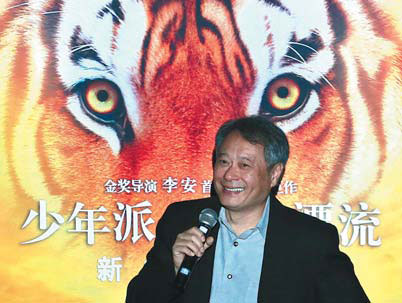Director serves 3-D slice of Life
Updated: 2012-11-03 07:35
By Liu Wei (China Daily)
|
||||||||
Academy Award-winning director Ang Lee's first foray into 3-D, Life of Pi, will open in China on Nov 22, the same day as its United States premiere.
Lee's adaptation of Yann Martel's book that has sold more than 7 million copies and spent years on the bestseller lists follows a young man who survives a disaster at sea and is hurtled into an epic journey of adventure and discovery. While cast away, he forms an amazing and unexpected connection with another survivor, a Bengal tiger.
 |
|
Director Ang Lee was in Beijing on Friday to promote his first 3-D film, Life of Pi, which will open in China on Nov 22. Jiang Dong / China Daily |
Li fulfilled the epic in four years, during which the pressure was so profound that he felt he was Pi, floating on an ocean and having no idea when he would see land again.
"I had emotional moments of telling myself I am the big director, so I will do whatever I want, a most-expensive art-house film that has a position in history," he said. "But it turns out that I actually want more from the film - it should be a universal story inspiring to a wider group, not only a group of elites."
The film challenged the 3,000-person crew by gathering the three most difficult things to shoot: an animal, water and a child - and in 3-D.
"Making the novel into a film was like a mission impossible at first, until I turned to 3-D to expand the scope of the film and envelop the audiences in the story's emotional hold," he said.
"3-D is a new cinematic language, and in Life of Pi it's just as much about immersing audiences in the characters' emotional space as it is about the epic scale and adventure."
In Taichung, Taiwan, Lee kept four Bengal tigers in what he called "five-star cages". Every tiger had its own garden. They played only part of the scenes, most of the time serving as references for visual artists to create the big cat on screen.
"I was delighted every time the tiger gave the movement I wanted and no one got eaten because of that," Lee joked.
Animal protection organizations in the US, Taiwan and India visited from time to time. Once Lee had to explain a computer-generated take that was so vivid that some Indian animal protectionists thought he must have used drugs to make a real tiger faint.
The team also built the world's largest self-generating wave tank in a deserted airport in the city, which worked as a functional working movie studio. Lee said he never found any shots of water that really amazed him before, so using 3-D he tried to achieve a new high-water mark, so to speak.
"Water is an important element in the film, serving as a magnificent stage where the story is told, as well as a mirror reflecting the characters' inner world."
The film has only publicly screened at the New York Film Festival in September, receiving overwhelming good reviews.
Todd McCarthy of the Hollywood Reporter commented: "This exceptionally beautiful 3-D production should prove accessible to and embraceable by all manner of audiences, signaling substantial commercial possibilities domestically and probably even more so internationally." Pete Hammond of Deadline.com hails it as "an instant awards contender" for Oscar 2013.
As the only Academy Award-winning Chinese director, Lee sees the event like the presidential election in the US.
"You have to eat rubber chicken at, at least, 15 to 20 dinners before building up some reputation," he joked about the campaign before the awards season.
The award would be a great acknowledgement for him and the whole team, he added, but the most beautiful thing about making a film for him is to provoke thoughts among viewers.
"Like what Pi says at the end of the film, at last we all have to tell our own stories," he said. "You can never make a film the audience wants exactly, so every time I leave some time for them to think about the film in their own minds. That is the most beautiful thing about filmmaking."
liuw@chinadaily.com.cn.

 Relief reaches isolated village
Relief reaches isolated village
 Rainfall poses new threats to quake-hit region
Rainfall poses new threats to quake-hit region
 Funerals begin for Boston bombing victims
Funerals begin for Boston bombing victims
 Quake takeaway from China's Air Force
Quake takeaway from China's Air Force
 Obama celebrates young inventors at science fair
Obama celebrates young inventors at science fair
 Earth Day marked around the world
Earth Day marked around the world
 Volunteer team helping students find sense of normalcy
Volunteer team helping students find sense of normalcy
 Ethnic groups quick to join rescue efforts
Ethnic groups quick to join rescue efforts
Most Viewed
Editor's Picks

|

|

|

|

|

|
Today's Top News
Health new priority for quake zone
Xi meets US top military officer
Japan's boats driven out of Diaoyu
China mulls online shopping legislation
Bird flu death toll rises to 22
Putin appoints new ambassador to China
Japanese ships blocked from Diaoyu Islands
Inspired by Guan, more Chinese pick up golf
US Weekly

|

|






